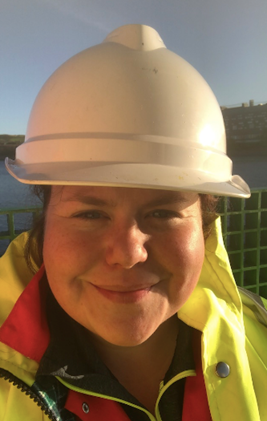
Role: Officer of the Watch (Deck Cadet)
Duration in current role: 2 years
Current work location: Grampian Conqueror; Emergency Response and Rescue Vessel (ERRV)
How do you get ready to start your day and how do you unwind at the end of the day?
My day consists of two 4hour watches, this is time spent on the bridge of the vessel whereby I am responsible for the safe navigation of the ship and the safety of all crew onboard. Due to my current training, the time I am on watch can vary, depending on the Captain, but I am most commonly on from 1200 to 1600 and from midnight to 0400. The schedule of watches can be difficult to adjust to initially but adapting to life onboard and settling into a routine/sleep pattern only takes a few days. A typical trip will last 28 days at sea, so rest periods are very important, but I like to unwind by using the gym, listening to music/audiobooks, socialising with the crew and speaking to my friends and family.
What is the best part of your current role?
I love being at sea and have enjoyed sailing from an early age. Being at sea offers a sense of freedom and adventure which I’ve never found in any land-based job. Every day is different and can bring new challenges, especially in the North Sea where the weather can change very quickly.
If you had to break it up into percentages, how do you spend your day?
A typical 24-hour period consists of 8 hours on watch as mentioned earlier (33.3%). Outside of this time, I am involved in the duties of a second officer, updating nautical charts and publications, checking the Life Saving Apparatus (LSA) and Fire Fighting Equipment (FFE) which includes checking survival suits, perry buoys, fire extinguishers, Emergency Escape Breathing Device (EEBD), secondary navigational equipment, to name but a few. We carry out emergency drills in order to practice and prepare for a real event, this might include practice using the Dacon Scoop (pictured), Man-overboard Drills or casualty-based scenarios which take part in the hospital area of the vessel. The equipment checks and emergency drills take place over the 28 days at sea but consists of around 16.7% of the day. The final 50% of my time is spent completing college work towards my training as an Officer of the Watch (OOW), going to the gym, sleeping and eating.

What is your favourite hobby / leisure activity?
I like to spend my time outside as much as possible. I took up running back in 2019 and when I’m not at sea I like to challenge myself to run at least 100km per month. I also enjoy yoga, horse riding, hill walking, sea swimming and sailing, even when I’m not working, I like being in and at sea!

What is something you cannot forget to do during your day?
Promoting and following a good safety culture onboard as well as always adhering to Rule 5 of the International Regulations for Preventing Collisions at Sea which states that;
”a proper look-out must be maintained by all available means appropriate on the prevailing circumstances and conditions.”
The North Sea can be very busy with vessel and rig movements and therefore the safe navigation of the vessel to avoid any risk of collision must take precedence. It’s important to always consider the safety and protection of the crew, vessel and marine environment.
What do you think we could do to make the O&G industry more inclusive?
I think the O&G industry could do more to target younger age students. For me, throughout school and even when I left school I had no real idea about a career and think that perhaps some input into education from an early age would have helped inform me about the opportunities available for within the O&G industry, whether that’s shore side, offshore, engineering, medical or any other sector of the industry.
What is the last song you listened to? (be honest)
The Chain, Fleetwood Mac sung by my 5-year-old nephew who had put on a concert for me and my family.
What is the most challenging part of your day?
My day can be especially challenging during bad weather, the conditions can make standing dangerous and sleeping difficult but it’s worth it for the good days when we have calm weather and some spectacular views of the sea, sunsets and dark starlit skies.

What kind of decisions do you make at work on a daily basis?
The weather in the North Sea has a major impact on the types of activities that need to be considered. As Officer of the Watch, I make decisions such as where best to position the ERRV ensuring that we remain in a ‘drift-off’ position or send the deck crew out to check the vessel, hatches, daughter craft etc are secure prior to bad weather. Maintenance of the vessel can often be dictated by the weather, as well as providing close standby duties to the installation.
Close Stand-by Duties, vessel is in the 500m zone to provided cover to the installation during overside work.
If there was a parallel universe with another version of ourselves, what job would you do there?
I think all versions of myself would probably have some affinity with the sea, although I do enjoy writing poetry so perhaps, I am a poet in another universe.
What three items would you like to have with you if you were stuck on a desert island (note, it must not include people or pets)?
I would want my Kindle full of books, a multi-tool knife and a lifetime supply of Tunnocks Teacakes!